If Trouble Was Money ...
After nine years, Don Hooker compiles the Bay Blues Festival’s greatest hits and biggest catastrophes
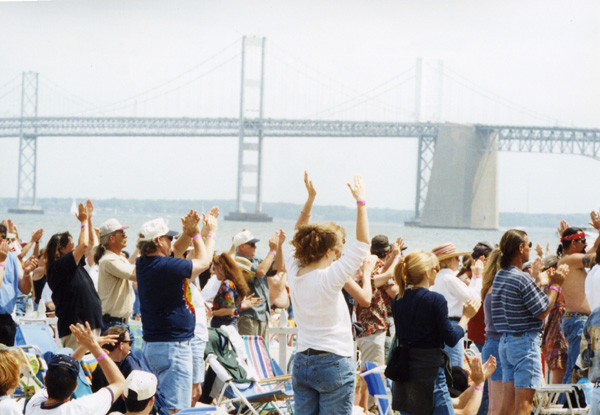
by Diana Beechener
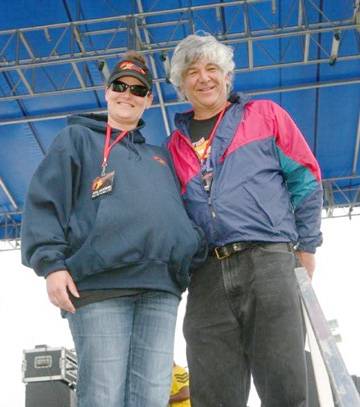
Since 1998, fans have swarmed to the Chesapeake Bay Blues Fest, the brain child of Don Hooker, right, and his daughter Sarah Petska.
|
If there ain’t pain, there ain’t the blues. Chesapeake Bay Blues Festival CEO Don Hooker knows this fact intimately. It took a painful lot of work and more than a little suffering on the side for Hooker to turn his charitable idea into a juggernaut fundraiser.
Looking back at nine years of festivals, Hooker talks about the logistics, lunacy and love of music that have sustained him and the festival for nearly a decade.
Track 1: History Repeating
Since founding the festival in 1998, Hooker and his team — consisting of daughter Sarah Petska and a volunteer staff — have labored to create an East Coast blues festival.
“I thought the East Coast needed a large blues festival,” explains Hooker. “The Long Beach Blues Festival in California inspired me.”
Just as the blues are sung, and heard, to alleviate pain, Hooker uses his blues festival to relieve suffering. Each year, the Chesapeake Bay Blues Festival donates all its proceeds to a handpicked group of charities.
Once Hooker decided on a non-profit charitable blues festival, he had to create it. He devised a simple formula: a two-day festival featuring the biggest names a meager budget could rally. Relying on trial and error, Hooker founded what’s grown to be one of the East Coast’s largest blues festivals.
“What have I learned? Don’t do blues festivals,” says Hooker, who also picked up more practical planning knowledge. “We’ve learned what our demographic is; we’ve learned what bands sell and what bands don’t. We’ve gotten better at managing the crowd and the logistics of the festival.”
With all this hard-earned knowledge, Hooker is still not in it for the money. He’s in it to give away money.
“Originally, our goal was to give money to charities with the lowest amount of overhead,” Hooker explains. “We try to target charities whose recipients can’t do for themselves. That’s shaking out mostly to be kids.”
Each Chesapeake Bay Blues Festival ticket you buy this year benefits Special Love, Special Olympics Maryland, We Care and Friends and The Johns Hopkins Cleft & Craniofacial Center.
| Know your Stars
Before you hear the legends play, get familiar with their music
The Yardbirds The British blues-influenced band was the starting place for three guitar legends — Eric Clapton, Jeff Beck and Jimmy Page — and influenced rock and roll with blues-inspired guitar riffs. The Yardbirds play at 4pm Saturday.
Shemekia Copeland When guitarist Johnny Copeland discovered that his daughter could sing, he booked Shemekia as his opening act when she was 16. Since then, the blues singer has released five albums and has become a staple on the blues festival circuits throughout Europe and America. Copeland takes the stage at 5:30pm Saturday.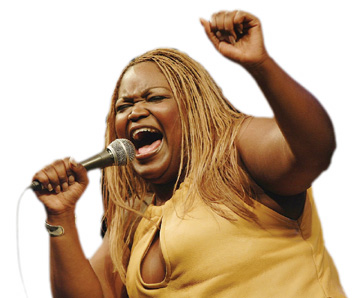
Buddy Guy The Chicago-style bluesman who inspired Eric Clapton, Jimi Hendrix and Stevie Ray Vaughan is known for his virtuoso guitar abilities and his showmanship. Hendrix was known to cancel his own shows so that he could sit in the audience of a Buddy Guy performance. Guy closes the blues festival Saturday night at 7pm.
Big Bill Morganfield This bluesman has to play to distinguish himself from his famous father, McKinley Morganfield — aka Muddy Waters. Though he never played professionally until after his father’s death in 1983, Morganfield has become a headliner in the Blues Festival circuit. Muddy Waters was one of the founders of the Chicago Blues, while Morganfield’s own sphere of influence draws from artists such as the Jackson 5. Morganfield takes the stage Sunday at 12:10pm.
Joe Louis Walker Bluesman Walker has played the blues with some of the best in the business, sharing a stage with John Lee Hooker, Buddy Miles and Muddy Waters. After taking time off the music circuit to earn a degree in music and English, the guitar man re-joined the scene with a more complete knowledge of the blues. Now known for his versatility as well as his virtuosity, Walker takes center stage at 4:15pm Sunday.
Jimmie Vaughan & the Tilt-A-Whirl Band Big brother to guitar god Stevie Ray Vaughan, Jimmie Vaughan has guitar credentials of his own. A Fender Stratocaster guitar has been named after him, and his distinct playing style has earned credit for reviving the Austin blues. Vaughan plays Sunday at 5:40pm.
Chuck Berry Guitar legend and rock and roll pioneer Chuck Berry is known, even at 83, for energetic on-stage performances. Berry influenced most of the 1960s rock and roll groups with his guitar-heavy sound. The early Beach Boys borrowed heavily from Berry’s lexicon; Surfin’ USA is a reworking of Berry’s Sweet Little Sixteen. Berry closes out the festival at 7pm.
|
Track 2: Born Under a Bad Sign
Like the blues that inspired it, the Chesapeake Bay Blues Festival thrives on hard times. In fact, the festival’s first year blues were so bad that it nearly ended then and there.
“The first year was the worst. We didn’t know what we were doing,” says Hooker of the 1998 Festival. “It poured both days. It was raining horizontally the wind was blowing so hard.”
Fans still packed Sandy Point State Park, propping up umbrellas and donning improvised rain gear. The blues men played on. A little rain is the least of their worries.
Hooker remembers the band Little Feat proved that they knew how to improvise. “They had a towel on the keyboard, and the drummer had a plastic trash bag on to stay dry.”
Some water-resistant fans chalked rain up to the Blues experience and danced in the torrential downpour as stagehands scurried to wrap tarps around instruments and electrical equipment.
Soggy grounds and large crowds gave Hooker a new set of blues to sing.
“It cost me about $30,000 to relandscape Sandy Point after the festival,” he says. “I have no idea why we did it a second year, though I think my attitude was We’ve seen the worst. If we can handle that we can handle anything.”
Track 3: Stormy Weather
In spite of an inauspicious start, Hooker remained determined to keep his popular festival. Beautiful weather and a bigger crowd gathered for the second year in 1999.
But the problem with holding a blues festival in Maryland’s May was that Hooker never knew what the weekend would bring. Sunshine or downpour, the show had to go on.
Hooker moved the 2007 concert to August to avoid May’s unpredictable weather. In true blues fashion, this led to a bigger problem.
“It was only in the summer once,” Hooker says. “But the heat almost killed all my volunteers.” The humid August days in 2007 were so oppressive that headliner Aretha Franklin had to take a break from her set to seek solace from the heat.
Hooker has concluded that both he and the crowds are prepared for whatever the moody month of May has to offer.
“It’s easy now,” Hooker says. “If we know the weather is coming, we wrap up the equipment so it doesn’t get wet. I stay on top of the weather radar. If there is something coming, we have plenty of time to react.”
The crowds know the score, too.
“We have a pretty loyal crowd. They come prepared for the weather,” Hooker says. “I’ve seen them out there in pouring rain, 40-mile-an-hour wind and 50-degree weather. It doesn’t bother them a bit.”
Hooker insists on the same temerity of spirit in his artists.
“Most of the artists are troopers; most of them want to play,” says Hooker, who could recall only a few weather-phobic performers — off the record. “If there’s no threat of electrocuting the musicians, we’ll go on.”
Buddy Guy, who headlines this year’s Saturday, May 22 set, proved that a little rain wouldn’t wash away his blues. He performed during the inaugural downpour in 1998. Then in 2007, lightning struck when he started his set.
God must be a fan.
“It looked like that was going to be a killer performance,” says Hooker of Guy’s 2007 set. “But he got about two and a half songs in when the skies opened up. I was at the side of the stage trying to get him to stop because the storm was coming, but he didn’t want to stop.”
Guy may be a trooper, but he’s not a fool. “When that first clap of thunder hit, he stopped.”
This year, Hooker hopes that Guy, a favorite among Blues Fest revelers, can get through a whole set without a weather disturbance. Only time (and the National Weather Service) will tell.
Track 4: Money Blues
Bob Dylan sang Where does the money go?
Don Hooker has a few ideas.
Finding the money is the problem with non-profit concerts. That’s why in 2008, Hooker gave the festival and himself a much-needed rest.
“It was a conscious decision to take 2008 off,” says Hooker, “only because it’s so demanding, nobody gets paid for it. It’s a lot to expect of everybody. People work 15 to 16 hours a day, and they’re not getting paid.”
The stress of organizing the festival took its toll, as well.
“I have to give myself a break too, because sometimes my pockets aren’t as deep as I would like them to be,” Hooker says.
This year, in the midst of a recession, everyone’s pockets are getting shallow.
“I know it’s probably a bad time to do festivals,” admits Hooker. “Most promoters I’ve talked to are losing money.”
But Hooker hasn’t worked this long and hard for money alone.
“We’re a charity festival,” he says. “And these charities that are already down in donations rely on us.”
Nine years in, Hooker knows that his first goal is raising money for charity. Even if that means upsetting blues purists by booking rock and roll acts.
“I did get a lot of grief for Three Dog Night,” says Hooker, who booked the folk-rock band for the 2007 festival. “But a lot of blues purists came up and told me later, I’ll never go on record as saying this, but I knew every word to every song they played.”
If there’s money to be made singing the blues in this economy, Don Hooker will make sure it gets to the right people.
Charity does a lot to lower an artist’s asking price. The first year of the festival, Hooker signed blues icon Buddy Guy and rising superstar Jonny Lang to the bill. Other stars are still out of the festival’s reach. Hooker reports that Eric Clapton is still too pricey, though he hopes to book Slowhand one day.
But in Hooker’s experience, some blues artists are worth more than their signing price. When Hooker signed his hero, James Brown, for the 2000 blues festival, the Godfather of Soul felt the need to give back.
“He is one of the only artists who’s ever given money for the charities while he was there,” Hooker says. “He came out of his dressing room and gave me $2,000 in cash and said, Give this to those kids you do this for.”
Track 5: Let the Good Times Roll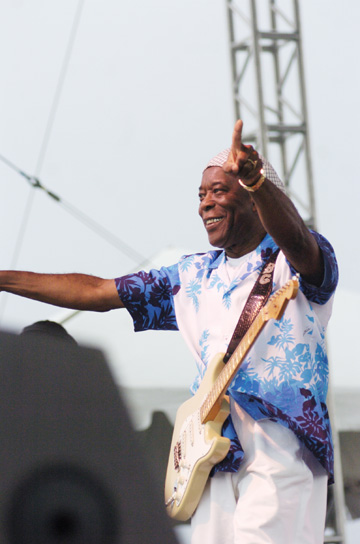
After nine years of blood, sweat and tears — and booking Blood, Sweat and Tears — why does Hooker keep the blues coming back to the Bay?
“It’s a magical event,” he says. He admits he has considered moving the location from Sandy Point, but he hasn’t had the heart to leave the Bayside venue. “Everyone tells me that it’s more than just a concert: I get emails all the time about people meeting their wives at the festival.”
A good sense of humor helps keep the blues coming. Hooker is full of anecdotes about minor headaches that turned into major amusements.
“One year, it had rained the night before. The sound engineer and I came in, and there were ducks floating on the stage,” Hooker says.
Maybe they knew how to jam.
As for Hooker’s favorite moments: “Probably the top three you couldn’t print,” he admits. “One of the craziest, we had some guy that snuck in backstage through the swamp. He was covered in mud up to his chest. I felt so bad I let him go into general admission. I’ll stop there, or I’ll get myself in trouble.”
Hooker’s other reason for all the toil and trouble: He loves the blues. And he loves the people who love the blues.
“My first priority is the people who return every year,” Hooker says. “There are a few thousand that no matter what the weather or the economy, they’ll be there. My first priority is pleasing them.”
So far, so good. Thousands crowd Sandy Point every year, hoping to sing the blues, rain or shine.
“We had someone the first year tell us there’s nothing better than sitting in the pouring rain listening to Buddy Guy,” he says.
We’ll have to wait and see, but Buddy Guy in the sunshine sounds pretty good, too.
Giving for Good
Two days of the blues make local charities pretty happy
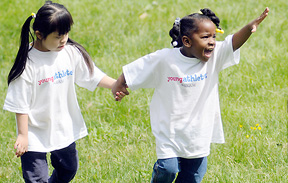 S S pecial Olympics Maryland creates free sporting events year-round to foster self-worth and independence in Marylanders with mental and physical disabilities: 800-541-7544; www.somd.org. pecial Olympics Maryland creates free sporting events year-round to foster self-worth and independence in Marylanders with mental and physical disabilities: 800-541-7544; www.somd.org.
We Care and Friends provides counseling and aid for people who have no home, are victims of abuse or are in need, with services including an annual Thanksgiving dinner for 3,000: 410-295-5223; www.wecareandfriends.com.
The Johns Hopkins Cleft & Craniofacial Center provides service for people with complex facial deformities. Patients ages 10 to 18 who qualify attend Camp FACE, where they undergo specialized expert treatments while enjoying a weekend of fun and games: www.hopkinscleft.com.
Special Love makes sure that kids battling cancer get to be kids through multiple programs such as family retreats, sibling bonding programs, a January ski trip and Camp Fantastic. The camp, for children ages 7 to 17, is a weeklong jamboree in Northern Virginia: 888-930-2707; www.specialove.org.
|
![]()

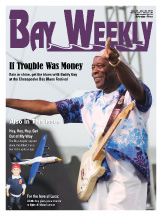




 S
S